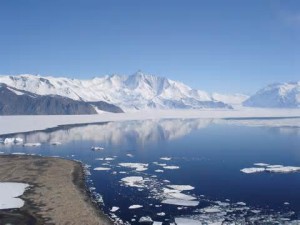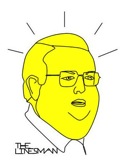 Imagine my shock when I discovered today that Chris de Freitas — the Auckland University academic who hit the news a couple of years ago when it was found that he was teaching climate denial to first year students, but who has a 20 year history of advocating for inaction on climate change — had made headlines by telling lies to a TV news operation. The headline: Kiwi scientist: Climate change not to blame for heatwaves. For a while it was top story on the TV3 News web site. Here’s how the story opens:
Imagine my shock when I discovered today that Chris de Freitas — the Auckland University academic who hit the news a couple of years ago when it was found that he was teaching climate denial to first year students, but who has a 20 year history of advocating for inaction on climate change — had made headlines by telling lies to a TV news operation. The headline: Kiwi scientist: Climate change not to blame for heatwaves. For a while it was top story on the TV3 News web site. Here’s how the story opens:
A New Zealand scientist has denied popular claims the recent Australian heatwave and other extreme weather events around the world are linked to global warming.
Here’s where de Freitas plays fast and loose with the facts:
The Australian government’s Climate Commission released a report last week stating: “climate change has contributed to making the current extreme heat conditions and bushfires worse”.
But associate professor of climate and environment science Chris de Freitas, from the University of Auckland, says this is not the case.
“There is no evidence to suggest that,” he says. “It’s really [just] hype.”
There’s the lie. De Freitas states without qualification that there’s “no evidence”. And yet the Australian Climate Commission’s report on the subject, prepared by three scientists with a great deal more experience and scientific mana than junior geographer de Freitas, states:
Climate change has contributed to making the current extreme heat conditions and bushfires worse.
The report provides a long list of peer-reviewed scientific studies to support its conclusions. But de Freitas keeps on digging a hole for himself:
Dr Freitas says the earth actually hasn’t warmed for at least a decade, and scientists do not know enough about climate change to tell if carbon dioxide emissions could cause large or damaging changes.
“There’s no evidence to suggest that what we’re doing is creating dangerous change.”
Tell it to the firefighters, Chris. Tell it to the people of Dunalley. Tell it to the Australian people suffering as climate change comes home to roost.
There are several questions that have to be asked about this “news” item. Why did TV3 go to de Freitas for a story in the first place? Was de Freitas touting his contrarian lies to the media, or were his friends at the NZ Climate “Science” Coalition, where he rejoices in the role of “science adviser”, pushing his views to news operations running short-staffed during the summer break?
Auckland University, which allows de Freitas to teach rubbish to its students under the guise of academic freedom, has to ask itself if it can really stand behind an employee who so egregiously lies in public. Academic freedom should be cherished, but allowing de Freitas’s nonsense to go unchallenged devalues the very notion, and diminishes the university’s hard won reputation as a centre of academic excellence.
Like this:
Like Loading...


 Over the last few years I’ve documented the current NZ government’s lackadaisical attitude to climate change policy. They’ve gutted the emissions trading scheme and dismantled sensible initiatives, ensuring that
Over the last few years I’ve documented the current NZ government’s lackadaisical attitude to climate change policy. They’ve gutted the emissions trading scheme and dismantled sensible initiatives, ensuring that  Imagine my shock when I discovered today that
Imagine my shock when I discovered today that  TV3’s Sunrise programme featured an interview with David Bellamy this morning. You can watch it
TV3’s Sunrise programme featured an interview with David Bellamy this morning. You can watch it
You must be logged in to post a comment.